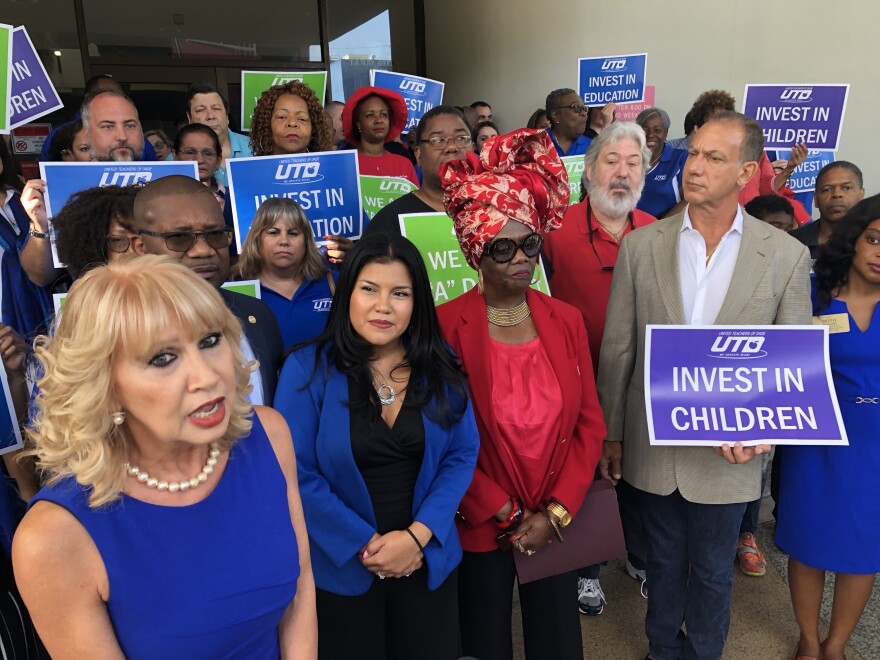Property owners in Miami-Dade County are one step closer to absorbing a tax increase that would pay for public school teachers and campus police officers.
The Miami-Dade County School Board voted on Wednesday to place a referendum on the Nov. 6 ballot asking voters if they’d be willing to pay more in property taxes. The increase would support raising salaries for teachers and other instructional staff, like teachers’ aides and school psychologists, and hiring additional school resource officers.
If approved, the tax hike would cost the typical homeowner $142 a year for the next four years, raising $232 million annually, according to the school board. It’s an increase of $0.75 per every $1,000 of assessed property value.
“It is a shock investment that fixes in one single year a lot of the historic wrongs and rights a lot of the inequities” in teacher salaries, Superintendent Alberto Carvalho said during a special school board meeting on Wednesday.
Carvalho recommended allocating 90 percent of the funds raised — about $209 million — to teacher salaries. The remaining 10 percent would equal $23 million for hiring police officers. One of the board members, though, recommended an 80-20 split of the money instead. The board ultimately delayed voting on exactly how the money would be divvied up.
A 1 percent salary increase for teachers and other instructional personnel would cost about $14 million. Carvalho advocated for raising the highest-performing teachers’ salaries up to 20 percent. But how the funding would be distributed among teachers and other staff would get worked out in collective bargaining negotiations with the local union, United Teachers of Dade.
Carvalho said the district needs at least $10 million more each year to post one police officer at every school in the district, and he suggested the school board establish a “cushion” that would pay for additional cops at bigger schools.
A new state law passed after the Feb. 14 shooting at Marjory Stoneman Douglas High School requires a police officer or an armed security guard on every school campus. The Miami-Dade district is working to comply with the law without arming anyone who is not a certified law enforcement officer, in part by partnering with local police departments to share the cost of placing officers at schools.
Board member Steve Gallon III pressed for teacher salaries to be the priority — not police officers.
“Pre-Parkland, this conversation has been about teacher salaries — post-Parkland, about the enhancement of our school security staff,” he said.
Carvalho defended the plan to spend some of the funding on school resource officers, saying students aren’t able to learn, and teachers aren’t able to work properly, if they don’t feel safe.
“That is why a percentage of these resources needs to be invested in the safety and security of our schools,” Carvalho said.
During the meeting, board members revised an earlier draft of the language for the referendum so it stated more specifically that the funding would be spent on compensation for teachers and hiring security personnel. The changes addressed some board members’ concerns that the original version was too broad and could be interpreted, for example, to support hardening school facilities rather than hiring police.
The referendum must now be approved by the Miami-Dade County Commission before being placed on the ballot.
Throughout the meeting, board members argued they were moving to raise taxes — despite concerns about exacerbating the unaffordability of housing in Miami-Dade County — because the Legislature has neglected public school funding.
“I hope we do not take the burden off Tallahassee, because we will continue to be a donor county,” said board member Marta Perez, arguing the large district subsidizes others throughout the state when education funding is distributed.
Leaders of UTD, the teachers’ union, held a press conference outside the school board building before the meeting on Wednesday to celebrate the district’s planned investment in raising educators’ salaries.
“For far too long — for decades — Miami-Dade public schools has been underfunded, and yet we continue to outperform,” UTD president Karla Hernandez-Mats said, referencing the district’s recent first-ever A rating. Teachers’ “work deserves to be compensated.”
The school districts in Broward and Palm Beach counties are taking similar steps to raise more money for teachers and security guards.
Palm Beach County school leaders plan to ask voters on Nov. 6 to pay $200 million more a year for four years. Broward’s referendum is slated for the Aug. 28 elections and could raise $93 million annually for four years.





